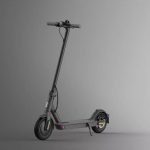Electric scooters, or e-scooters, have seen a rapid rise in popularity over the last few years. While it’s only legal to use them on private land at the moment, that could all be about to change. Electric scooter rental trials have been underway in a number of areas across the UK since summer 2020. Local councils have been working with rental providers to test the viability of electric scooters as a safe and effective mode of transport.
Then, in May 2022, plans to fully legalise e-scooters for private use were included in the Queen’s Speech. The UK government is working through the details of the regulations required to enable the legalisation of private e-scooters on public land, and further details are expected in the King’s Speech, expected in autumn 2023, and there could be legislation in 2024.
So, could commuting by electric scooter soon become a possibility? Here we take a closer look at the government’s trial scheme, the recent legislation announcement, and what they could mean for the future of electric scooters in the UK.
How does the trial work?
Electric scooter companies, working with local areas, will provide scooters on the street for hire (similar to rental schemes seen in other countries). These electric scooters will be legal to use on public roads (except motorways) and in cycle lanes and cycle tracks.
Users will be able to unlock an electric scooter using an app, ride to their destination, park the scooter and pay via the app (usually priced by the length or duration of the journey).
It’s important to note that the trial doesn’t cover privately owned electric scooters and these will remain illegal to use outside of privately-owned land.
When did the trial start?
The trial began in July 2020 and was due to end in November 2022, but has since been extended to May 2024.
Where is the trial taking place?
Before the trial was fast-tracked, it was due to take place in four areas of the UK: the West Midlands, Portsmouth and Southampton, the West of England Combined Authority (Bristol and Bath), and Derby and Nottingham.
You can find an up-to-date list of which areas are taking part on the Government website.
Who can take part in the trial?
The government has made the following recommendations about who can take part in the trial and what the requirements are:
- Anyone who has a full or provisional driving license can use a trial electric scooter
- Users need to be 16 or older
- Users won’t be required to complete a mandatory training course (such as the CBT course required for motorcycles and mopeds)
- Wearing a helmet will be recommended, but not mandatory
- The companies that provide the trial electric scooters for rental will also be required to provide insurance
What are the laws around electric scooters in the UK right now?
It’s currently legal to own an electric scooter in the UK, but illegal to use it on public roads, cycle lanes and pavements. This is because electric scooters are regulated by the same law as motor vehicles but can’t meet the same requirements in terms of licenses, insurance, and other documentation.
Private electric scooters are now set to be legalised for use on public roads across the UK after plans were included in the Queen’s Speech. The UK government is working through the details of the regulations required to enable the legalisation of private e-scooters on public land. Further details are expected in the King’s Speech, expected in autumn 2023, and there could be legislation in 2024.
In the House of Lords on the 11th of May, Baroness Vere (Under-Secretary of State in the Department of Transport) said: “It is our intention that the [Transport] Bill will create a low-speed, zero-emission vehicle category that is independent from the cycle and motor vehicle categories. New powers would allow the Government to decide the vehicles that fall into this new category in future and how they should be regulated to make sure that they are safe to use. We hope that e-scooters will be the first of these vehicles.”
Until that time, customers should be aware that if they use a private e-scooter illegally, they could face a fine and penalty points on their licence, and the e-scooter could be impounded by the police.
For more info about electric scooters and the law, check out our advice article.
What does all this mean for commuting by electric scooter?
The trial scheme and the inclusion of the Transport Bill in the Queen’s speech and the expected inclusion in the King’s speech indicate that the Government are keen to examine e-scooter legislation. It’s likely that we’ll see changes to current laws, as well as proposals for new legislation, to regulate the use of private e-scooters over the coming months. This could, potentially, pave the way for private scooters to be used on UK roads sometime soon.
This a great news for commuters, particularly in the current environment. Electric scooters have the potential to bring a lot of benefits to the daily commute:
- They’re a green mode of transport that helps to reduce the carbon footprint
- They have the potential to reduce congestion, with motorists switching to scooters
- They support social distancing, which is a challenge that public forms of transport continue to face
- They’re affordable, with models starting from around £200
- They’re portable and easy to store, with many models featuring lightweight frames and quick-folding mechanisms
As you can see, if commuting by electric scooter does become an option in the future then it’s seriously worth considering.
Where can I buy an electric scooter?
At Halfords, we’ve got a great range of electric scooters that includes best-selling brands such as Xiaomi and Carrera. We also offer a selection of electric scooter accessories and an annual electric scooter care plan that includes puncture protection, unlimited puncture repair, unlimited brake adjustments and free fitting for any accessories.
To find out more about our electric scooter range, and how to find the perfect scooter for you, check out our Electric Scooter Buyer’s Guide.
We hope this has given you a good overview of the government’s electric scooter trial and what this might mean for the future of commuting. For lots more great advice, head over to our e-scooter help and advice guides.
Halfords is here to get you where you want to be.
Legal warning:
It’s currently illegal to ride a privately owned e-scooter on a public road, pavement, cycle lane or bridleway. Privately owned e-scooters can only be ridden on private land with the permission on the landowner.
Customers should be aware that if they use a private e-scooter illegally, they could face a fine and penalty points on their licence, and the e-scooter could be impounded


